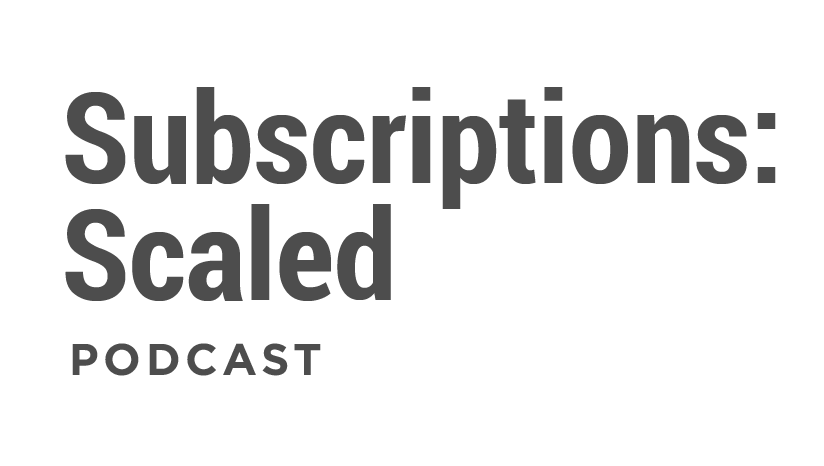Episode 07: Tips for Running a Successful Subscription Startup feat. Sinohe Terrero, CFO at Envoy
In this episode of the Subscriptions: Scaled podcast, Nick Fredrick, President of Rebar Technology Solutions, is joined by Sinohe Terrero, CFO at Envoy. They explore subscription through the lens of entrepreneurs and discuss best practices and common pitfalls that subscription startups should focus on. They also touch on how COVID-19 has impacted subscription, whether subscription startups should build or buy, and more.
Sinohe Terrero is a serial entrepreneur who has worked at startups that have IPO’d, startups that have been acquired, and startups that have failed. Because he has worked at such a variety of startups, he has had to learn how to adapt and cater towards multiple types of startup structures. This includes navigating startups with different sales cycle lengths, startups that respond better to non-traditional marketing channels, and so on.
Common Pitfalls for Subscription Startups
Because of Sinohe’s extensive experience and time spent in the startup realm, he was able to share some of the common challenges he’s observed in startups that he’s worked for over the years. For example, he’s seen that many subscription startups believe that if they have a proof of concept, their product will be successful. However, while some startups may have no problem acquiring early adopters, scaling beyond early adopters can prove to be much more challenging. In the same vein, some companies have a lot of money on hand to experiment with new products - including products that they may not necessarily move forward with.
Sinohe also emphasizes the importance of marketing. He states that while he’s seen many subscription startup founders brush over marketing, taking the time to understand marketing channels early on is an essential component to ensuring that the business will be able to scale as it grows.
Best Practices for Post-Acquisition in Subscription Startups
Sinohe also dives into best practices for startups during post-acquisition. He suggests that while many subscription startups focus more on acquiring new subscribers than on keeping their existing subscribers, it is actually more beneficial for them to dedicate an equal, if not greater, amount of resources toward engaging existing subscribers. This is because acquiring new customers is incredibly costly and especially for subscription businesses, the longer a subscriber stays on, the greater their lifetime value is.
In order to keep customers engaged, Sinohe recommends looking as far into the future as possible at subscriber health. This means monitoring subscriber activity to identify warning signs that might be precursors to both voluntary and involuntary churn, analyzing how subscribers are using the product (e.g. identifying high-value actions, specific features that subscribers use more frequently, etc.), receiving feedback from subscribers, and so on. Sinohe stated that in his experience, subscribers would sometimes submit complaints and feature requests for problems that had already been solved. This told both him and his startup that the feature they built out was important and that they needed to do a better job circulating it. In general, Sinohe emphasizes that actively engaging and communicating with subscribers is one of the best practices when it comes to post-acquisition for subscription startups.
How to Balance Building vs. Buying
The question of whether a subscription startup should build or buy the components that make up their subscription operations (e.g. billing, payments, etc.) has long been debated in the subscription realm. There are pros and cons to both, and Sinohe outlines his thoughts on each. In general, he recommends that businesses only build things that are core to their product. He emphasizes that as subscription startups have limited resources, it’s important that they focus more on their customer than on building out a product that is someone else’s core product. However, he also adds that dedicating time to proper implementation of SaaS solutions is key for subscription startups looking to buy a solution.
How COVID-19 Has Impacted Subscription Startups and Consumer Behavior
Sinohe wraps up the episode by diving into his observations around how COVID-19 has impacted both Envoy and general consumer behavior. He shares that like many other companies, COVID-19 gave Envoy a push to quickly develop a product to match subscriber needs. The product, a management system for the new COVID-19 workplace that pre-registers people before they go into the office, delegates seating once in the office, and more, has helped Envoy evolve in a positive way and has seen a significant amount of success. This is likely due to one of his main observations around changes in consumer behavior - namely, that consumers now place more focus on subscribing to things they need rather than things they want. In this case, people need to, rather than want to, understand how to manage their office space during COVID-19.
To hear more of Sinohe’s subscription startup expertise, tune into this episode of the Subscriptions: Scaled podcast.
—
Ready to get started with Rebar?
Head to rebartechnology.com or email info@rebartechnology.com to schedule a call today.
